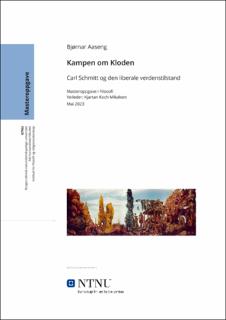Kampen om Kloden: Carl Schmitt og den liberale verdenstilstand
Master thesis
Permanent lenke
https://hdl.handle.net/11250/3080563Utgivelsesdato
2023Metadata
Vis full innførselSamlinger
Sammendrag
Denne oppgaven utforsker de sentrale tankene i Carl Schmitt sene verk, The Nomos of the Earth in the International Law of the Jus Publicum Europaeum (1950). Schmitt har blitt drøftet og tatt i bruk av de som, på høyre- og venstresiden, søker etter antiliberale alternativer i politisk tenkning og filosofi. Denne oppgaven utforsker også Schmitt antiliberalisme, men et originalt trekk er at den, på norsk, forsøker å kartlegge antiliberalismen i et av Schmitts sene og sentrale verk. Oppgaven spør hva som kjennetegner Schmitts antiliberalisme og hans kritikk av den nyeste perioden i folkeretten (fra og med første verdenskrig), nærmere bestemt krigens regler, verkets sentrale tema. Dette gjøres ved å plassere verket i forbindelse med viktige sider i Schmitts forfatterskap: Rettsteori, det politiske og politisk teologi. Denne delen av oppgaven viser hvordan dette sene verk av Schmitt og dets tema, folkerett, kan ses i forbindelse med Schmitts tidligere forfatterskap. Etter denne delen kommer en drøfting som bruker de allerede diskuterte sidene i en eksegese av The Nomos of the Earth. Denne delen utforsker Schmitts tanker om folkerett og tar opp de sentrale temaene i Schmitts tekst: Nomos som begrep; den før-globale folkeretten og middelalderen; Schmitts beskrivelse av europeisk kolonisering; det europeiske statssystemet og dens folkerett; og Schmitts kritikk av USA som en liberal supermakt og dets forsøk på å legge frem en ny folkerett. Oppgaven viser at dette sene verk av Schmitt kan brukes til å kritisere det nåværende folkerettsregiment, men viser også at, bortsett fra Schmitts drøfting av den europeiske fortiden, konkrete alternativer er vanskelig å finne frem til i Schmitts tekst.
Nøkkelord: Folkerett, krigens regler, Carl Schmitt, The Nomos of the Earth. This thesis explores the central thoughts of Carl Schmitt's late work, The Nomos of the Earth in the International Law of the Jus Publicum Europaeum (1950). Schmitt has been discussed and used by those, both on the right and the left, who are searching for an antiliberal alternative in political thought and philosophy. This thesis also explores Schmitt’s anti-liberalism, but an original contribution is that it, in Norwegian, tries to explore antiliberalism in one of Schmitt’s late and central works. This thesis asks what characterizes Schmitt’s anti-liberalism and his critique of the latest period in international law (since World War I), more precisely the rules of war, the work’s central theme. This is done by placing the work in connection with important aspects of Schmitt’s authorship: Legal theory, the political and political theology. This part of the thesis shows that this late work by Schmitt and its theme, international law, can be seen in connection with Schmitt’s earlier authorship. This is followed by a discussion where the already discussed aspects is used in an exegesis of The Nomos of the Earth. This part explores Schmitt’s thoughts about international law and discusses the central themes in Schmitt’s text: Nomos as a concept; pre-global international law and the Middle Ages; the European state system and its international law; and Schmitt’s critique of the United States as a liberal superpower and its attempt to construct a new international law. The thesis shows that this late work by Schmitt can be used to critique the current international law regime, but it also shows that, except for Schmitt’s discussion of the European past, concrete alternatives are hard to come by in this text by Schmitt.
Keywords: International law, rules of war, Carl Schmitt, The Nomos of the Earth.
